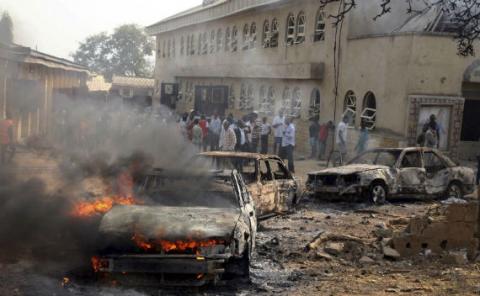U.S. designates Nigerian Islamist group as terrorist organization By Guy Taylor - Washington Times

U.S. authorities officially has designated the shadowy Nigerian Islamist group Boko Haram as a terrorist organization, ending what has been a heated debate in the past year within the State Department on the status of the group, which is believed to have ties to al Qaeda affiliates in Africa.
“Boko Haram is a Nigeria-based militant group with links to al Qaeda in the Islamic Maghreb that is responsible for thousands of deaths in northeast and central Nigeria over the last several years including targeted killings of civilians,” the State Department said in statement Wednesday.
While Boko Haram began as a locally focused group claiming to represent impoverished people in Nigeria’s predominantly Muslim northern regions, it began to draw serious international scrutiny in August 2010 after a suicide car bomb killed 18 people at the U.N. headquarters building in the Nigerian capital of Abuja.
A group claiming to be Boko Haram declared itself responsible for the attack.
More recently, there has been evidence of increasing collusion between the Nigeria-based group and al Qaeda in the Islamic Maghreb. Analysts point to a flow of weaponry — including rocket-propelled grenades — from the al Qaeda offshoot to Boko Haram in the past year.
U.S. authorities also added the Ansaru organization, a particularly active splinter group attached to Boko Haram, to the list of foreign terrorist organizations.
The designations pave the way for other U.S. agencies, including the U.S. Treasury Department, to clamp down on money flowing to the two groups. “These designations will assist U.S. and other law enforcement partners in efforts to investigate and prosecute terrorist suspects associated with Boko Haram and Ansaru,” the State Department said Wednesday.
But officials stressed that the designations are “only one tool in what must be a comprehensive approach by the Nigerian government to counter these groups through a combination of law enforcement, political, and development efforts, as well as military engagement, to help root out violent extremism while also addressing the legitimate concerns of the people of northern Nigeria.”
Rep. Edward R. Royce, California Republican and chairman of the House Foreign Affairs Committee, praised the development.
“Boko Haram — which translates into ‘education is prohibited’ — is another example of how the threat from al Qaeda is spreading,” Mr. Royce said Wednesday. “For years, the ‘Nigerian Taliban’ has been working to impose its strict ways in [Nigeria‘s] Muslim north. Once believed to be strictly local, its fighters are increasingly linking up with other al Qaeda-linked groups in the region.”
Mr. Royce stressed the nation’s security interest in seeing a stable Nigeria.
“Designation as a Foreign Terrorist Organization will allow U.S. intelligence and law enforcement agencies the necessary authority to freeze Boko Haram’s assets and to stop entities providing support to the organization,” he said.
The development, meanwhile, signals a key shift in the State Department’s thinking about the evolution of terrorist activity in Africa.
U.S. authorities initially had resisted adding Boko Haram to America’s list of foreign terrorist organizations, which increasingly has targeted internationally minded organizations in recent years.
By keeping the originally locally focused Boko Haram off the list, U.S. and Nigerian government officials had left open the possibility of attempting to pursue direct and peaceful negotiations with the group.
That window will now close because adding Boko Haram to the terrorist organization list effectively bars any American contact with the organization.
Source: Washington Times
